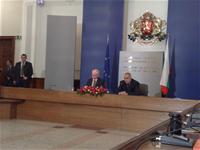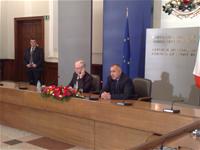Herman van Rompuy: I want to get to know you
Adelina Marini, December 14, 2009
 A strong message gave the elected as first president of the European Council Belgian prime minister Herman van Rompuy who is on a visit to Bulgaria today. In a very short statement, without opportunity for questions, the more popular as a president of the EU said that he was using the time before taking over his duties from the 1st of January, to get to know EU leaders and to establish close personal relations with them. He said that for a person coming from Western Europe and from an old member state it was very important to understand well the challenges the new EU member states were facing.
A strong message gave the elected as first president of the European Council Belgian prime minister Herman van Rompuy who is on a visit to Bulgaria today. In a very short statement, without opportunity for questions, the more popular as a president of the EU said that he was using the time before taking over his duties from the 1st of January, to get to know EU leaders and to establish close personal relations with them. He said that for a person coming from Western Europe and from an old member state it was very important to understand well the challenges the new EU member states were facing.
Nevertheless, Mr. Van Rompuy underlined that he was fully aware of the hard economic hardships in Bulgaria as well as of the intensive efforts of the new Bulgarian government to tackle the economic crisis and to restore the positive image of the country. According to him, Bulgaria is on the right track but still has to exit the crisis, to modernise in many aspects and to create conditions for Eurozone membership. Thus he responded indirectly to the growing discussions in Bulgaria about a quick introduction of the single European currency.
Herman van Rompuy drew a not very rosy picture of the economy of the EU in the future. He said that in the long-term the economic growth of the Union was estimated to be less than 1% of GDP which was quite insufficient for the creation of new jobs and for financing the specific social model of Europe. This is why the main priority of the Union will be the development of a new economic strategy to succeed the current Lisbon strategy for growth and jobs. The Document has been prepared by the Swedish Presidency of the EU which ends on the 31st of December and will be discussed in detail at the informal European Council in the beginning of February (the summit of EU leaders).
Another priority, mentioned by the Belgian prime minister was the "climate crisis" as he defined  the efforts to achieve a binding climate change agreement in Copenhagen. As expected he did not comment on the humble contribution of Bulgaria to the global Fund to help poor countries face climate change impact but he mentioned that the Bulgarian prime minister would take part in the summit in Copenhagen this week. Bulgaria's contribution to the Fund will be 20,000 euro per year, starting from 2011.
the efforts to achieve a binding climate change agreement in Copenhagen. As expected he did not comment on the humble contribution of Bulgaria to the global Fund to help poor countries face climate change impact but he mentioned that the Bulgarian prime minister would take part in the summit in Copenhagen this week. Bulgaria's contribution to the Fund will be 20,000 euro per year, starting from 2011.